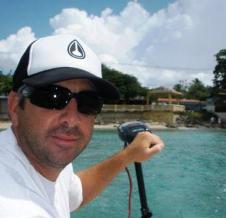 From New England and the Caribbean to Africa, South and Central America, what drives St. Thomas-based anger, Joel Finley, to fish, he says, “is the thrill of the hunt.”
From New England and the Caribbean to Africa, South and Central America, what drives St. Thomas-based anger, Joel Finley, to fish, he says, “is the thrill of the hunt.”
A native of Newport, Rhode Island, growing up surrounded by water, it was only natural that Finley started fishing nearly as soon as he could walk.
“My father got me into the sport,” Finley says. “He had a sailboat. We’d live on it during the summer and I’d fish from off the docks. Then, after he sailed it down and won best visiting boat in St. Thomas’ Rolex Regatta back in 1978, he sold the sailboat and started fishing commercially. That’s when we moved out to Cape Cod.”
Finley spent his high school summers in search of blue fin tuna, harpooning them from the water and spotting them from a plane. A job like this certainly had its excitement.
“There was the time when my father and I sank a boat offshore,” says Finley.
The two had caught 800 pounds of tuna off Jeffries, Maine, and steamed into port to unload the fish. The next day, with a boat full of bait, they were steaming out of Cape Cod when the vessel sounded like it hit something in the water. All of a sudden, both bilge pumps went off. Finley rushed down to grab the life jackets and found himself standing knee deep in water. He yelled to his father that the boat was going down, grabbed the duffle with flares and fired one off. The nearest vessel was a whale watcher 12 miles away. 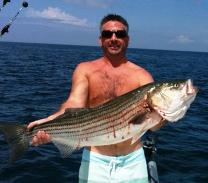 In less than 45 minutes, the whale watcher picked up the two fishermen and the vessel overturned and sank just as the Coast Guard arrived with a pump. It seems that the fiberglass had come out of the stuff box which allowed the propeller to shoot up through the hull of the 35-foot Bruno like a chain saw.
In less than 45 minutes, the whale watcher picked up the two fishermen and the vessel overturned and sank just as the Coast Guard arrived with a pump. It seems that the fiberglass had come out of the stuff box which allowed the propeller to shoot up through the hull of the 35-foot Bruno like a chain saw.
“The boat sat on the bottom for three weeks, through Hurricane Bob, before we could salvage it,” Finley says. “My father fixed it up and it’s still out fishing today.”
Life on the seas led Finley to enroll in Massachusetts Maritime Academy, but after a year he found a business career was more to his liking and he headed west to enroll in Sierra College in California.
“I didn’t get to do any fishing, but I did perfect my skiing skills,” says Finley, who adds he did head back to Cape Cod and fish for blue fin in the summers.
Finley moved to Boston after graduation. He started work for his father’s construction company, where he handled site acquisition for wireless towers during the boom in the late 1990s. He also continued to fish commercially part-time as well as embark into recreational fishing as well.
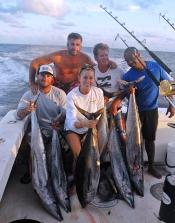 “I bought a 20-foot 1970-built Seacraft and rebuilt it,” Finley says. “I had moved down to New York and would go out for striped bass, albacore tuna, bonito and small blue fin tuna on spinning rods. I also got into fly-fishing back then as well.”
“I bought a 20-foot 1970-built Seacraft and rebuilt it,” Finley says. “I had moved down to New York and would go out for striped bass, albacore tuna, bonito and small blue fin tuna on spinning rods. I also got into fly-fishing back then as well.”
The big difference between commercial and recreational fishing, Finley says, “is what species you target. Also, recreational fishing is less stressful and a lot more fun.”
Finley eventually moved back to Cape Cod, sold the Seacraft, got his captain’s license, purchased a 36-foot BHM and put this vessel into charter out of Sandwich Marina, in Massachusetts. He also got his pilot’s license and became a tuna spotter as well as charter fisherman.
In 2007, a job opportunity as vice president of sales presented itself with Glacial Energy, a retail energy supplier, and he moved to the company’s headquarters in St. Thomas.
“Virgin Islands’ waters offered a totally different type of experience fishing and I started fishing more for blue marlin,” Finley says.
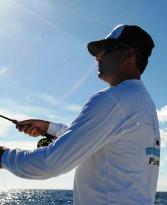 He didn’t catch his first blue marlin in the Virgin Islands, but instead two years before his move off the coast of Ghana. Here, Finley and a friend chartered a boat for a couple days of fishing. His friend caught a nearly 800-pound blue marlin one day. The next day, the village chief asked the charter captain to kill the next marlin to provide food. That turned out to be Finley’s fish, an estimated 450-pounder he caught in a 20-minute fight using stand-up tackle.
He didn’t catch his first blue marlin in the Virgin Islands, but instead two years before his move off the coast of Ghana. Here, Finley and a friend chartered a boat for a couple days of fishing. His friend caught a nearly 800-pound blue marlin one day. The next day, the village chief asked the charter captain to kill the next marlin to provide food. That turned out to be Finley’s fish, an estimated 450-pounder he caught in a 20-minute fight using stand-up tackle.
“That marlin fed the whole village,” he says.
Finley’s travels have led him to Brazil for blue marlin, to Costa Rica, where he caught six sailfish on fly in one of his best fishing days, and to Venezuela for bonefish.
Back home in the Virgin Islands, he found every day of fishing was good.
“My best day was last summer where I caught three blue marlin in one day and the last was on a spinning rod off Anegada,” he says.
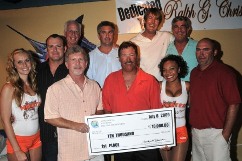 Finley’s luck started the year before when he joined the Gulf Rascal team to fish the July Open Billfish Tournament. Four anglers – Finley, as well as Lee Steiner, Rick Steiner, Gerald McKinnley – with Capt. Billy Borer at the helm and mate Glen Helton in the cockpit, collectively released five blue marlin in three days to win the tournament.
Finley’s luck started the year before when he joined the Gulf Rascal team to fish the July Open Billfish Tournament. Four anglers – Finley, as well as Lee Steiner, Rick Steiner, Gerald McKinnley – with Capt. Billy Borer at the helm and mate Glen Helton in the cockpit, collectively released five blue marlin in three days to win the tournament.
“I thought all tournaments would be that easy,” Finley joked. “We fished both the July Open and the Boy Scout (USVI Open/Atlantic Blue Marlin Tournament) on my boat this past summer and let’s just say we didn’t do as well.”
He did win the Fisher’s Cove Tournament in Virgin Gorda over Easter, a popular gamefish event.
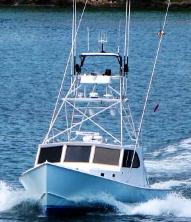 Finley fishes off his 40-foot H&H downeast-style lobster boat in the Virgin Islands.
Finley fishes off his 40-foot H&H downeast-style lobster boat in the Virgin Islands.
“It’s great in the sometimes rough waters offshore and its economical to run,” he says. “I can compete with the big boys and afford to do so.”
A friend came up with an idea for a fun name and Finley instantly agrees, dubbing his vessel, Fishizzle.
“I try to fish every weekend,” Finley says.
What’s his next horizon?
“I just got a custom rod made,” he says, “and my goal is to catch a blue marlin on fly.”
